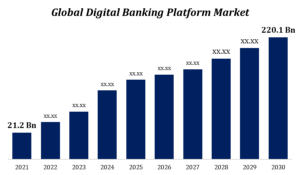The Impact of Fintech on Traditional Banking: Adapting to a Digital Era
The rise of fintech has disrupted the traditional banking landscape, forcing financial institutions to adapt to the digital era. Fintech companies leverage technology and innovation to provide convenient, customer-centric financial services, challenging the established banking norms. In this blog, we will explore the impact of fintech on traditional banking and discuss how banks are responding to the changing landscape by embracing digital transformation.
- Enhanced Customer Experience: Fintech has raised the bar for customer expectations in the financial industry. Fintech companies offer seamless digital experiences, user-friendly interfaces, and personalized services. This has prompted traditional banks to invest in digital platforms, mobile banking apps, and online services to meet customer demands for convenience, accessibility, and a personalized banking experience.
- Accelerated Digital Transformation: The emergence of fintech has accelerated the digital transformation of traditional banks. They are investing in modernizing legacy systems, adopting cloud computing, and harnessing big data analytics to drive operational efficiency, enhance risk management, and deliver faster and more personalized services to customers. This transformation enables banks to streamline processes, reduce costs, and improve the overall customer experience.
- Collaboration and Partnerships: Recognizing the innovation and agility of fintech startups, traditional banks are embracing collaboration and partnerships. They are collaborating with fintech companies to access new technologies, enhance their service offerings, and tap into the expertise of these digital disruptors. Collaborations enable banks to combine their scale and customer base with the innovative solutions offered by fintech, resulting in improved products and services for customers.
- Expansion of Digital Banking Services: Traditional banks are expanding their digital banking services to remain competitive in the digital era. They are offering online account opening, digital payments, remote account management, and chatbot support. Banks are leveraging artificial intelligence and machine learning to provide personalized financial advice, robo-advisory services, and tailored product recommendations to customers.
- Embracing Open Banking: The concept of open banking, facilitated by fintech, promotes data sharing through secure application programming interfaces (APIs). Traditional banks are opening up their systems to third-party providers, enabling customers to access a broader range of financial services and allowing innovative fintech solutions to integrate with their platforms. Open banking fosters collaboration and innovation, benefiting both banks and customers.
- Addressing Security and Regulatory Concerns: While embracing digital transformation, traditional banks place a high emphasis on cybersecurity and regulatory compliance. They invest in robust security measures, encryption technologies, and fraud detection systems to protect customer data and transactions. Banks also work closely with regulatory authorities to ensure compliance with evolving regulations in the digital banking space.
The impact of fintech on traditional banking is undeniable, forcing banks to adapt to the digital era and meet changing customer expectations. Fintech has revolutionized the customer experience, driving traditional banks to invest in digital transformation, expand digital banking services, and embrace collaborations with fintech startups. The adoption of new technologies, open banking, and enhanced security measures are key strategies employed by banks to remain competitive and relevant in the digital landscape. By leveraging the strengths of fintech and combining them with their own established infrastructure and expertise, traditional banks can create a harmonious fusion of traditional banking services and digital innovation, delivering enhanced value and convenience to customers in the digital era.


































